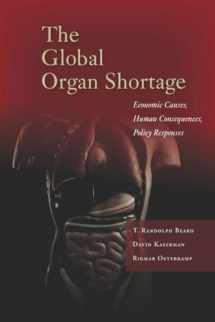
The Global Organ Shortage: Economic Causes, Human Consequences, Policy Responses (Stanford Economics and Finance)
ISBN-13:
9780804784092
ISBN-10:
0804784094
Edition:
1
Author:
David L. Kaserman, T. Randolph Beard, Rigmar Osterkamp
Publication date:
2013
Publisher:
Stanford Economics and Finance
Format:
Hardcover
264 pages
FREE US shipping
Book details
ISBN-13:
9780804784092
ISBN-10:
0804784094
Edition:
1
Author:
David L. Kaserman, T. Randolph Beard, Rigmar Osterkamp
Publication date:
2013
Publisher:
Stanford Economics and Finance
Format:
Hardcover
264 pages
Summary
The Global Organ Shortage: Economic Causes, Human Consequences, Policy Responses (Stanford Economics and Finance) (ISBN-13: 9780804784092 and ISBN-10: 0804784094), written by authors
David L. Kaserman, T. Randolph Beard, Rigmar Osterkamp, was published by Stanford Economics and Finance in 2013.
With an overall rating of 3.9 stars, it's a notable title among other
books. You can easily purchase or rent The Global Organ Shortage: Economic Causes, Human Consequences, Policy Responses (Stanford Economics and Finance) (Hardcover) from BooksRun,
along with many other new and used
books
and textbooks.
And, if you're looking to sell your copy, our current buyback offer is $0.3.
Description
Although organ transplants provide the best, and often the only, effective therapy for many otherwise fatal conditions, the great benefits of transplantation go largely unrealized because of failures in the organ acquisition process. In the United States, for instance, more than 10,000 people die every year either awaiting transplantation, or as a result of deteriorating health exacerbated by the shortage of organs. Issues pertaining to organ donation and transplantation represent, perhaps, the most complex and morally controversial medical dilemmas aside from abortion and euthanasia. However, these quandaries are not unsolvable. This book proposes compensating organ donors within a publicly controlled monopsony. This proposal is quite similar to current practice in Spain, where compensation for cadaveric donation now occurs "in secret," as this text reveals. To build their recommendations, the authors provide a medical history of transplantation, a history of the development of national laws and waiting lists, a careful examination of the social costs and benefits of transplantation, a discussion of the causes of organ shortages, an evaluation of "partial" reforms tried or proposed, an extensive ethical evaluation of the current system and its competitors.


We would LOVE it if you could help us and other readers by reviewing the book
Book review

Congratulations! We have received your book review.
{user}
{createdAt}
by {truncated_author}


